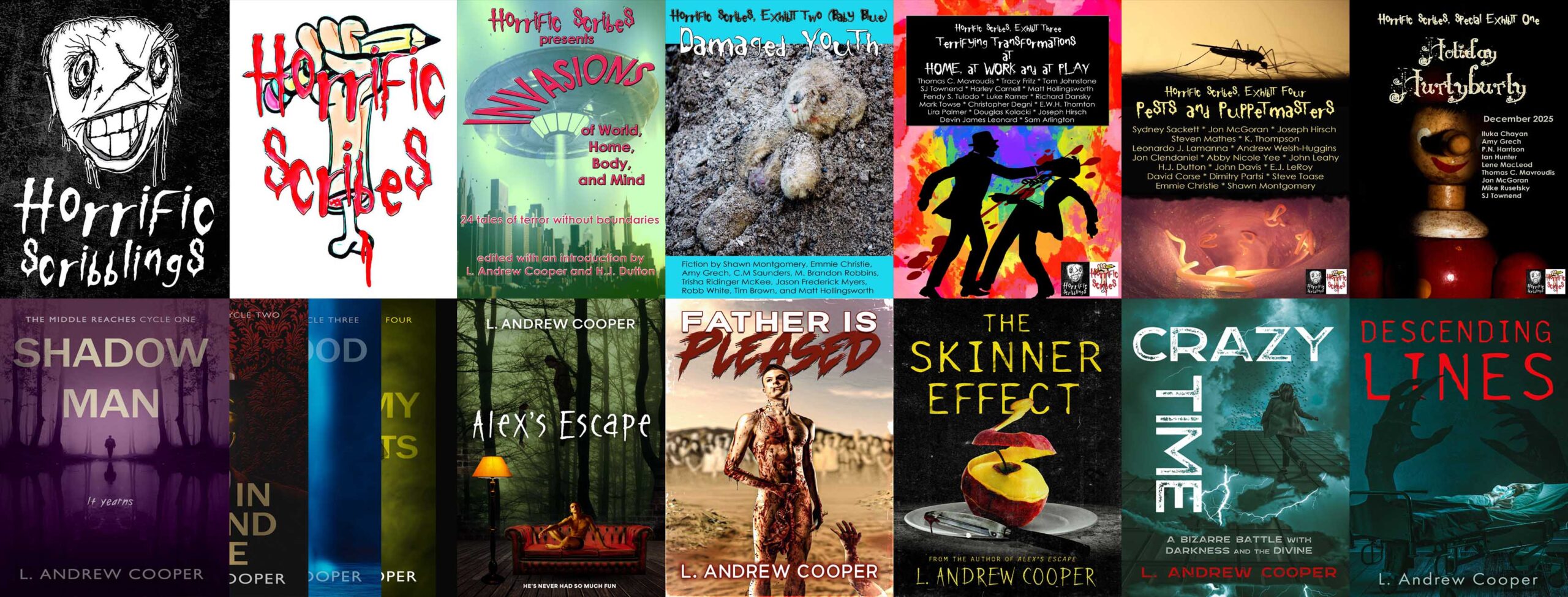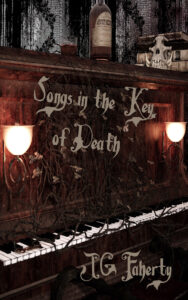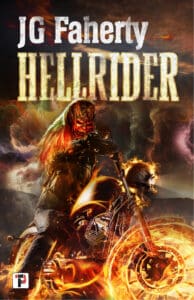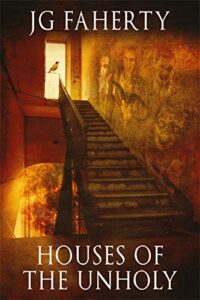Accomplished author of dark literature J.G. Faherty has graciously granted my request to answer questions about two of his newest works, terrifying novel Ragman and spellbinding poetry collection Songs in the Key of Death.
Ragman
Part supernatural terror, part police procedural. I wanted to write a book about mummies for a long time, but I didn’t want it to be the same old stuff. So I came up with this:
In 1882, a group of British soldiers plunder an Egyptian temple and kill the high priest. The priest vows revenge and is finally revived in the present day. He finds the great-grandson of the man who killed him, but they form an uneasy partnership to get back all the stolen artifacts and send all the descendants of the other soldiers to the Underworld. Two police officers, former partners who had a falling out, must put aside their differences as they go from trying to solve gruesome, unexplained murders to risking their lives to stop the supernatural mummy the priest has called forth.
Songs in the Key of Death
I never considered myself a poet (still don’t), but over the years I wrote some stuff here and there, and this year I realized I had enough for a collection. My poetry tends to be dark, sharp, and short. Here’s a review:
“I love the way JG Faherty’s extraordinary poetry collection plays with language, form, and emotion. These pieces are by turns frightening, melancholy, disturbing, smart, and darkly witty. Songs in the Key of Death is a hit!” —Lisa Morton, six-time Bram Stoker Award® winner
The Interview
(1) Procedural Wraps. What inspired you to combine elements of police procedural with a tale of revenge from beyond the grave and a supernatural mummy? How did the combination feel while you were writing?
JGF: I didn’t set out to write a modified police procedural; that kind of just happened as I worked out the plot details. My first thoughts were, I want a mummy in modern times, and I want it to be different than any other mummy story/movie ever done. So, I researched mummies and discovered this one called an ushabti, which is more like a golem in that it can be called forth at will and then sent back to the underworld. It’s sort of a mummy hitman for Osiris. But then I needed a reason for it to be called forth, which led to revenge as a subplot, and a second mummy who awakens in the modern world. So, mummies and murders. Originally, I was going to set it in a small town, but then NYC seemed a better choice, because of different settings, the crimes not being as noticeable, etc. Which is what led to police officers – someone has to investigate the locked room murders. Thus, police procedural.
(2) Bloody Mummy. I find some procedurals to be gorier than most mainstream horror. How “gruesome” does Ragman really get, and how do you feel about writing the explicit, nasty stuff?
JGF: Not really gruesome at all. There are some bloody scenes – depictions of a dismembered body, etc. – but they’re brief. This is not Texas Chainsaw Massacre or Saw, it’s more Silence of the Lambs or Se7en; in fact, if this were a TV show or movie you could watch it on regular TV. I’ve written some gory, nasty stuff in the past, and I have no problem with it if it’s appropriate to the story, but in this case, it wasn’t. I was more focused on building tension, creating suspense, than shocking people with blood and guts. If you want that from me, read my novel Hellrider. That gets explicit!
(3) Ragtime. Multi-part question with obnoxious intro. Your choice of the year 1882 shows you’ve done your research, so you undoubtedly know that in the late nineteenth and early twentieth centuries, colonialism and a craze for Eastern relics led to demand for English-language stories with African, and especially Egyptian, connections, spawning classics such as Bram Stoker’s Jewel of the Seven Stars (1903, probably the most famous mummy novel, Anne Rice notwithstanding) and Richard Marsh’s The Beetle (1897, my personal favorite). Did this period’s fiction influence Ragman, and if so, how? You’ve chosen a contemporary setting for most of your novel’s action, a time when Western relations with Egypt are quite different. How does Egyptian lore mix with current realities, and how will readers relate to a mummy taken so far from its typical context?
JGF: Let’s break that down. First, I hate research. I do what’s necessary for the plot of the book, but I don’t do deeeep delves. So, once I knew my intro – British soldiers plunder a tomb in the Victorian days – my research consisted of looking up the time period when the British occupied Egypt, and when they happened to be near some of the major areas of relics/pyramids, etc. Giza’s been used too many times, so I chose a lesser known (to the general public) area of ancient worship and tombs. Then I looked up a couple of newspaper clippings from the time to get a feel for the language. That was it. I purposefully didn’t go back and read Rice’s book, or The Beetle (I didn’t know about Stoker’s book, now I have to get it!), because I didn’t want those influences in my head. Since I’ve been wanting to write a book involving mummies for years, I already had all sorts of research in my files about the underworld, the gods, the mummification process, etc.
I chose a contemporary setting because I felt it would make it more exciting and interesting, plus all the other mummy books and movies focused on either ancient Egypt or the 1930s. Always try to be different! Aside from the intro, everything else takes place in modern NYC or the Egyptian afterlife. That required some research, too! But it was interesting.
I don’t think I really incorporated current Egyptian socio-political concepts into the book; it’s more about modern life in NYC and relationships and criminology; because the murders are individuals, there’s not even a step into terrorism territory. I didn’t want that, just like I didn’t want any focus on the pandemic, so I set it after that was over.
I’m hoping readers are good with my mummies in modern NYC rather than ancient Egypt; I want them to relate to the setting, feel comfortable with it, so it becomes just part of the background, and they can focus on the action and mystery and characters. Readers have no problem with werewolves or vampires or ghosts in modern life, so why not mummies?
(4) Mummy Movies. You might boil this question down to this tri-lemma: Boris Karloff, Peter Cushing and Christopher Lee, or Brendan Fraser and co.? Which mummy movies are your favorites and why? How did the movies influence Ragman?
JGF: Well, I enjoy the Universal mummy movies (the old ones) because of the nostalgia factor, but let’s face it. They were the dullest of all the classic Universal movies. Most of them moved at a snail’s pace. The first two Fraser movies are among my favorite supernatural-thriller-action movies of all time (they’re not horror!), right up there with the Indiana Jones movies and Van Helsing. They’re good fun, popcorn movies.
But I didn’t want that. I wanted suspense, chills, and mystery. So, really none of those movies influenced the book. However, they did influence my love of Egyptian lore, just like Rice’s book, and made me want to write my own, very different tale.
(5) Songster. You’ve put together a collection of poetry, but you say you still don’t consider yourself a poet. Why not?
JGF: Because it’s not something I do very often. It took years for me to write enough poems to make a collection. Probably only 5 or 7 of them were previously published. I’m a writer, and occasionally I write poetry. I mean, does that make me a poet? I write novels, short stories, and novellas. Am I a novelist? A storyteller? I’ve written a few essays – am I an essayist? I’ve got two scripts I’ve written but never sold. Am I a scriptwriter? I just go with “writer” and kind of leave it at that. To me, saying poet or novelist kind of indicates you specialize in that form.
(6) The Key of Dark. What makes your poetry “dark?” Imagery? Subject matter and/or themes? A combination? Something else? An example or two might be nice.
JGF: Yeah, definitely the subject matter and themes. Originally, the book was going to have a much longer, quirkier title (Anatomies, Anomalies, Anemones) because the first several poems dealt with mad scientists experimenting on bodies, alien life forms, and undersea civilizations. But then as I added more, the subject matter became more varied (suicide, ghosts, brain parasites, serial killers, and so on), and when I looked at it broadly, pretty much everything dealt with death in some manner. And I have this “thing” for titles that are twists on famous albums. My last short story collection was Houses of the Unholy. And for this, I remembered how Stevie Wonder’s Songs in the Key of Life was such an uplifting album, and my poems were the opposite, so… Songs in the Key of Death. And then Lycan Valley Press did a great job with the cover art.
(7) The Key of Form. Lisa Morton praises you for playing with language and form. What are your favorite kinds of linguistic play? How would you describe your poetry formally? Do you use established forms or stick with free verse? Why?
JGF: And this goes back to me not being a poet! I don’t know much about the forms of poetry. Don’t ask me about pentameter or this kind of poem vs. that kind of poem. I’d have to look up how to write a haiku, and those are only a few lines! What I do know is that I like my poems to be short and impactful. Sometimes they rhyme, sometimes they don’t. Some are broken into almost choruses and verses, like a song. Others keep the same pattern throughout. I’ve always been a storyteller, so all my poems tell a story. Some probably read almost like flash fiction, but without the sentence structure and punctuation. The other thing is, just like what I write (and enjoy reading), I want the poems to be understandable. I don’t go crazy with allusions or comparisons or vague inferences. I hate books and movies with no clear endings, and I hate poems where you don’t actually know what it’s about. I guess you could say this is working man poetry.
(8) Hit Music in the Key of Death. Audiences for poetry often differ from audiences for narrative (and especially speculative) fiction. How much do you think the audience for your fiction will overlap with the audience who will enjoy your poetry? Why?
JGF: We’ll see, won’t we! I honestly have no idea. I hope they like it. My advance readers all did. None of them (and I’d have trusted their opinions) told me it sucked. I suppose if you only read novels or short stories, poetry isn’t your thing and you won’t read it. But if you read other horror poetry, I hope that people will like this. It’s different, just like my books. And people read those.
(9) Hit Writer J.G. Faherty. I’ve read your work and admire your highly readable style and refined voice, and I’m also impressed by your list of accomplishments. I therefore have to ask a fairly typical interview question: what advice do you have for writers still honing their crafts and looking to break out?
JGF: Thanks – people should know that we got to know each other when you published one of my stories in Reel Dark. Which was a great anthology! My advice is: Write. Practice the craft. Don’t worry about word counts per day. Do what you can. Sometimes writing is just sitting there and trying a bunch of stuff until something clicks. Some days I work on stories, other days on whatever novel I’m writing, whatever I’m in the mood to do. And read, read a lot. Too many young people today think that anything written before 2010 is no good, and that any writer over the age of 35 doesn’t have any useful advice. Well, I’m here to say it’s the opposite. Those older folks have learned this business the hard way – they’ve gone through the rejections, the edits, the practice, the ups and downs of the biz. They know how to craft a submission letter, how to pitch a book in 3 sentences, and most importantly how to use the language in a way that people want to read. So read, write, and take advice without arguing or laughing it off. And finally, don’t be afraid to submit. Writing is like baseball – you will fail way more often than you succeed. You need a tough skin. Submit, get rejected, and submit again. Over and over until you build traction. Self-publishing is easy, but you’ll never know if you’re actually good or not. Save it for after you’ve sold some stories or books to professional markets and established a readership. Then you can publish yourself.
(10) Access! How can readers learn more about you and purchase your works (please provide any links you want to share)?
JGF: I’m pretty active on social media. Facebook, Twitter (X), Instagram – I’m jgfaherty on all of them. My website is www.jgfaherty.com. And, of course, look for JG Faherty on Amazon or Barnes & Noble for all my books. As always, thanks for reading!
Note from Andrew: If you’re interested in contributing a guest post or interview to this site, contact me!
About the Author
JG Faherty is the Bram Stoker Award®- and ITW Thriller Award-nominated author of 19 books and more than 85 short stories. He writes adult and YA horror/sci-fi/fantasy, and his works range from quiet, dark suspense to over-the-top comic gruesomeness.
A lifelong resident of New York’s highly haunted Hudson Valley region, JG grew up amid Revolutionary War graveyards, haunted roads, and woods filled with ghostly apparitions. His varied professional career includes working as a resume writer, laboratory manager, accident scene photographer, zookeeper, scientist, and salesman. He began writing fiction in 2001, and his short stories, poetry, and articles have appeared in numerous magazines and anthologies.







Comments are closed.